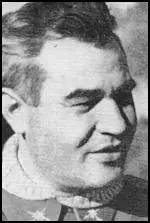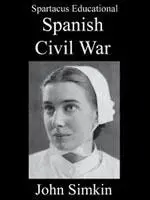Emilo Klémer

Emilo Klémer (real name Manfred Stern) was born into a Jewish family in Bucovina, Romania, in 1895. He studied medicine at the University of Vienna where he joined the union of socialist students.
On the outbreak of the First World War he joined the Austro-Hungarian Army. Klémer reached the rank of captain but in 1917 he was captured by the Russian Army and taken to a prisoner of war camp in Siberia. After the Russian Revolution he was set free. By this time he had developed communist views and joined the Bolsheviks.
Red Army's Fourth Bureau
Klémer became a member of the Red Army and led a partisan unit against Admiral Alexander Kolchak and the White Army during the Russian Civil War. He impressed his superiors with his military skills and he was sent to the Frunze Military Academy for further training. In 1923 he was recruited by Red Army's Fourth Bureau (military intelligence) and served under General Yan Berzin. Other agents in the GRU included Ignaz Reiss, Richard Sorge and Walter Krivitsky.
When French forces occupied the Ruhr Valley, Klémer and six other officers were sent to the area to encourage resistance. This involved working with the German Communist Party. They created "small units of men whose function was to shatter the morale of the Reichswehr and the police." Krivitsky was involved in forming assassination units who "struck swiftly and effectively in various parts of Germany, picking off police officers and other enemies of the Communist cause".
German Revolution
Lenin saw the opportunity to ferment a communist revolution in Germany. He ordered Gregory Zinoviev to organise an uprising. Some senior figures, including Karl Radek, Nickolai Bukharin and Yuri Piatakov hurried to Germany to get military units in strategic locations ready for a nationwide revolt, which would be launched at the command of Moscow. Zinoviev proposed an uprising in Hamburg. Communists in the city, believing themselves backed by a national uprising, took to the streets, attacked the police station and occupied major facilities. However, they did not receive support from other working-class groups and the rebellion was crushed in three days. Walter Krivitsky commented: "When we saw the collapse of the Comintern's efforts... we took the best men developed by our Party Intelligence... and incorporated them into the Soviet military intelligence."
Peter Wright, a senior figure in MI5, explained in his book, Spycatcher (1987) that Klémer was one of a group of "great illegals" that included Ignaz Reiss, Walter Krivitsky, Theodore Maly, Arnold Deutsch, Richard Sorge, Dmitri Bystrolyotov, Leopold Trepper, Henri Pieck, Hans Brusse and Alexander Radó. "They were often not Russians at all, although they held Russian citizenship. They were Trotskyist Communists who believed in international Communism and the Comintern. They worked undercover, often at great personal risk, and traveled throughout the world in search of potential recruits. They were the best recruiters and controllers the Russian Intelligence Service ever had."
Spanish Civil War
According to Gary Kern, the author of A Death in Washington: Walter G. Krivitsky and the Stalin Terror (2004): "In 1927 he became a Comintern military instructor, and in the early 1930s went on special assignments to China, where he was the chief military advisor to the indigenous Communist Party." On the outbreak of the Spanish Civil War he was sent to Spain and became the first leader of the International Brigades. He took the surname of one of Napoleon's generals, Jean-Baptiste Klémer, "a name that was easy for the Spaniards to pronounce and one that facilitated his fame".
By the 1st November 1936, 25,000 Nationalist troops under General José Enrique Varela had reached the western and southern suburbs of Madrid. Five days later he was joined by General Hugo Sperrle and the Condor Legion. This began the siege of Madrid that was to last for nearly three years. Francisco Largo Caballero and his government decided to leave the city on 6th November, 1936. This decision was criticized by the four anarchists in his cabinet who regarded leaving the capital as cowardice. At first they refused to go but were eventually persuaded to move to Valencia with the rest of the government.
Largo Caballero appointed General José Miaja as commander of the Republican Army in Madrid. He was given instructions to set up a Junta de Defensa (Defence Council), made up of all the parties of the Popular Front, and to defend Madrid "at all costs". He was aided by his chief of staff, Vicente Rojo. Miaja's task was helped by the arrival of General Klémer and the International Brigades. The first units reached Madrid on 8th November. The Thaelmann Battalion, a volunteer unit that mainly consisted of members of the German Communist Party and the Communist Party of Great Britain, was also deployed to defend the city.
On 13th December 1936, the Nationalists attempted to cut the Madrid-La Coruna road to the north-east of Madrid. After suffering heavy losses the offensive was brought to an end over Christmas. On 5th January 1937, the attack was resumed. During the next four days the Nationalist gained ten kilometres of road and lost around 15,000 men. Klémer and the International Brigades, defending the road, also suffered heavy losses during this battle.
Klémer was withdrawn from Madrid in January 1937. As commander of the 45th Division, Klémer fought at Brunete (July, 1937) and Santander (August 1937). According to Walter Krivitsky, it was decided by Joseph Stalin that the Comintern "had done its job and its leaders were no longer needed, particularly if they knew too much". Klémer was recalled to Moscow. By the summer of 1937, over forty intelligence agents serving abroad were summoned back to the Soviet Union.
Great Purge
Stalin had decided to purge his agents serving abroad. All these men had been willing to risk their lives in order to ferment world revolution. However, Stalin had decided on a "socialism in one country" policy. He feared that NKVD agents were supporters of Leon Trotsky. Amongst those recalled and executed included Theodore Maly, Vladimir Antonov-Ovseenko and Yan Berzin. Several decided to defect, this included Ignaz Reiss, Walter Krivitsky and Alexander Orlov. Reiss and Krivitsky were later assassinated and only Orlov survived in exile.
Klémer was arrested but he was not executed like some of the NKVD agents. Gary Kern, the author of A Death in Washington: Walter G. Krivitsky and the Stalin Terror (2004), has argued: "In succeeding decades the memoirs of Spanish Communists and the writings of Soviet hacks on the Spanish Civil War either failed to mention his name or downplayed his role. It is now known that he was not shot at the time, but arrested, beaten on the legs with steel rods and sent to a Gulag camp with a twenty-five-year term."
Emilo Klémer died of exhaustion at a labor camp in Sosnovka on 18th February, 1954.
Primary Sources
(1) Gary Kern, A Death in Washington: Walter G. Krivitsky and the Stalin Terror (2004)
Klémer claimed to be a Canadian, but his passport was a fake. He had never been to Canada; his real name was Stern, first name Moishe - Manfred, Maurice and Lazar are also recorded. Actually he was born in Bukovina, a province of the Austro-Hungarian Empire on the border of Romania and Ukraine, not far south of Krivitsky's birthplace. He studied medicine and belonged to the union of socialist students at Vienna University. Drawn into WWI, he was captured by the tsarist army, but protested with the international prisoners movement in Siberia. Set free by the October coup, he joined the Bolsheviks and led Red units in victories over the White Army of Aleksandr Kolchak.
After the civil war, he trained at the Frunze Military Academy and worked in the Fourth Department along with Krivitsky. He was involved in the March 1921 putsch in Germany and was one of the organizers of the disastrous Hamburg uprising of 1923. In 1927 he became a Comintern military instructor, and in the early 1930s went on special assignments to China, where he was the chief military advisor to the indigenous Communist Party. In Spain he took the surname of one of Napoleon's generals, Jean-Baptiste Klémer, a name that was easy for the Spaniards to pronounce and one that facilitated his fame. But though a general, he was not really in command. According to Krivitsky, Moscow directed his every move, even the form of his interviews. He was not the powerhouse the outside world thought him to be, but rather a showy diversion from the hidden work of the Red commanders. Unlike the others, posing as a foreign volunteer, he gave the battle cry and led his men into fire.
His glory was short-lived. In January 1937 he was removed from Madrid. While he continued to command troops at the front, leading a battalion in the Aragon offensive in august and September, behind the lines vicious tongues conspired against him, and his support was cut. It was said that he was vain, ambitious and insufficiently dedicated to the Communist cause. Orlov once came looking for him and found him holed up in a cowshed filled with dung, the warmest place he could find at night. Then he was removed from his command, the victim of a cabal between Spanish and Soviet commanders.
(2) Hugh Thomas, The Spanish Civil War (1961)
When he (Walter Ulbricht) spoke of military leaders, he indicated a short figure with grey hair, his overcoat buttoned up to his neck-"General Emilio Klémer". Klémer was now forty-one, a native of Bucovina, then Rournania, at his birth part of Austria-Hungary. His real name was Lazar or Manfred Stern, his nom deguerre that of one of the ablest of the French revolutionary generals. In the First World War, he served as a captain in the Austrian army. Captured by the Russians, he was imprisoned in Siberia. At the Revolution, he escaped and joined the Bolshevik party. After taking part in the Russian Civil War, and forming a part of the International Brigades active there, he joined the Cominrern military section. He was sent on confidential missions in the Chinese Wars and perhaps also to Germany. Other rumours made Klémer a veritable Flying Dutchman of revolutionary war. Now appropriately he arrived in Spain, as the first leader of the first International Brigade. He was built up well by propaganda, as a "soldier of fortune of naturalized Canadian nationality". On being introduced to his future command by Marty, he stepped forward and gave the salute of the clenched fist, amid a roar of applause.

